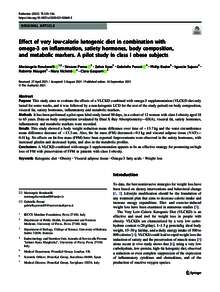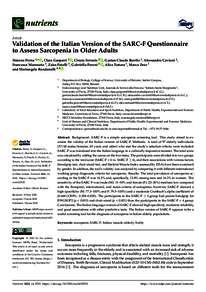Document
Effectiveness of a Novel Food Composed of Leucine, Omega-3 Fatty Acids and Probiotic Lactobacillus paracasei PS23 for the Treatment of Sarcopenia in Elderly Subjects A 2-Month Randomized Double-Blind Placebo-Controlled Trial
Linked Agent
Gasparri, Clara , Abridger
Barrile, Gaetan Claude, Abridger
Battaglia, Santina, Abridger
Cavioni, Alessandro, Abridger
Giusti, Riccardo, Abridger
Moroni, Alessia, Abridger
Nannipieri, Fabrizio, Abridger
Patelli, Zaira, Abridger
Title of Periodical
Nutrients
Issue published
Volume 14 - Issue 21
Country of Publication
Bahrain
Place Published
Sakhir, Bahrain
Publisher
University of Bahrain
Date Issued
2022
Language
English
Subject
English Abstract
Abstract:
Sarcopenia is a complex process characterized by a progressive decrease in muscle mass and strength. Various nutrients have been shown to be effective in supporting muscular performance. This randomized clinical trial aimed to evaluate the effectiveness of a 2-month administration of food for special medical purposes composed of omega-3 fatty acids (500 mg), leucine (2.5 g), and probiotic Lactobacillus paracasei PS23 (LPPS23), on appendicular lean mass (ALM), muscle performance, inflammatory status, and amino acid profile in sarcopenic patients. A total of 60 participants (aged 79.7 ± 4.8 years and a body mass index of 22.2 ± 2.1 kg/m2) were enrolled and randomly assigned to either intervention (n = 22) or placebo group (n = 28). Comparing the differences in effects between groups (intervention minus placebo effects), ALM increased significantly in the intervention group (p < 0.05), with no discernible change in the placebo group. Similarly, significant differences were also observed for the Tinetti scale (+2.39 points, p < 0.05), the SPPB total score (+2.22 points, p < 0.05), and the handgrip strength (4.09 kg, p < 0.05). Visceral adipose tissue significantly decreased in the intervention group compared to the placebo group at 60 days −0.69 g (95% CI: −1.09, 0.29) vs. 0.27 g (95% CI: −0.11, 0.65), groups difference −0.96 (95% CI: −1.52, 0.39, p = 0.001). A statistically significant increase in levels of valine, leucine, isoleucine, and total amino acid profiles was observed in the intervention group compared with the placebo group at 60 days (p = 0.001). When taken together, these beneficial effects may be attributed to the innovative composition of this special medical-purpose food which could be considered for the treatment of sarcopenia in the elderly.
Member of
Identifier
https://digitalrepository.uob.edu.bh/id/bc91df8e-b9d2-4fc9-956a-f40811335a6e
Same Subject



